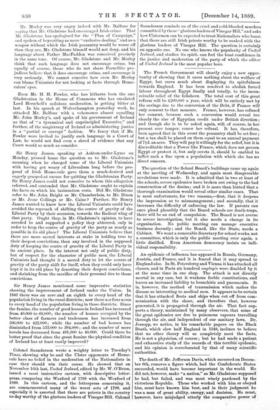Sir Henry James, speaking at Ashton-under-Lyme on Monday, pressed home
the question as to Mr. Gladstone's meaning when he charged some of the Liberal Unionists with having got weary of Liberalism long before the pro- posal of Irish Home-rule gave them a much-desired and eagerly grasped-at excuse for quitting the Gladstonian Party. Sir Henry James could not conceive to whom this allegation referred, and contended that Mr. Gladstone ought to explain the facts on which his insinuation rests. Did Mr. Gladstone refer to Mr. John Bright or Mr. Chamberlain, to Mr. Dixon or Mr. Jesse Collings or Mr. Caine ? Further, Sir Henry James wanted to know how the Liberal Unionists could have avoided the reproach of shifting the centre of gravity of the Liberal Party by their secession, towards the Radical wing of that party. Ought they, in Mr. Gladstone's opinion, to have acceded to and supported a policy they abhorred, only in order to keep the centre of gravity of the party as nearly as possible in its old place? The Liberal Unionists believe that there are more sacred interests at stake in holding true to their deepest convictions, than any involved in the supposed duty of keeping the centre of gravity of the Liberal Party in its ancient place. In the interest not only of public duty, but of respect for the character of public men, the Liberal Unionists had thought it a sacred duty to let the centre of gravity of the party shift for itself, when they could only have kept it in its old place by deserting their deepest convictions, and shrinking from the sacrifice of their personal ties to those convictions.










































 Previous page
Previous page